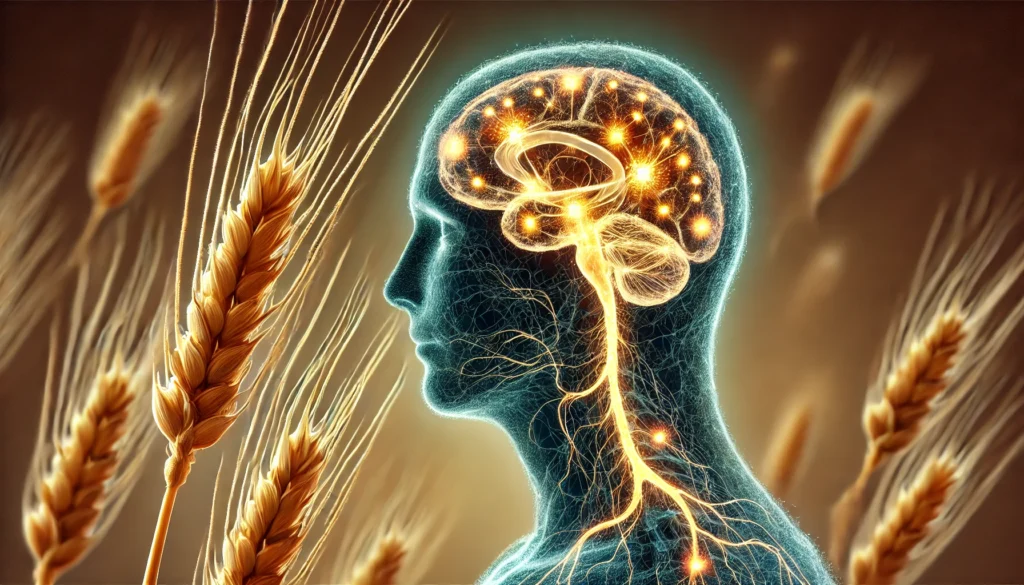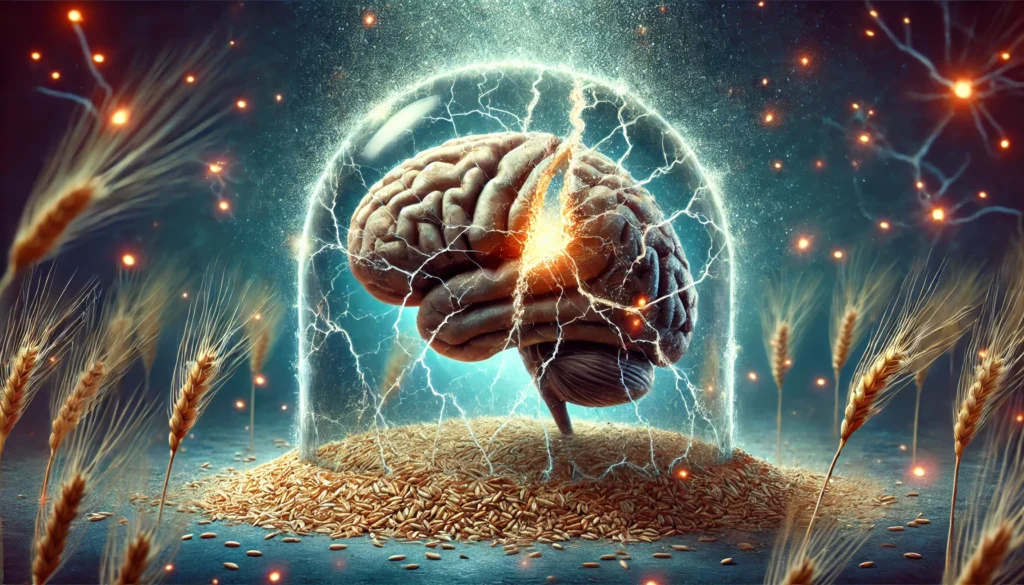Introduction: The Hidden Link Between Celiac Disease and Neurological Disorders
Celiac disease is widely recognized as an autoimmune disorder that primarily affects the digestive system. However, emerging research has highlighted its impact beyond the gut, revealing a significant connection between celiac disease and neurological disorders. Among these manifestations, brain fog, cognitive impairment, and other neurological symptoms are increasingly associated with gluten consumption in individuals with celiac disease. The neurological effects of gluten intolerance can be profound, leading to conditions such as gluten neuropathy, gluten ataxia, and even more severe cognitive disturbances.
Understanding the neurological symptoms of celiac disease is essential for those struggling with unexplained cognitive issues. By exploring the mechanisms behind these symptoms, individuals can make informed dietary and lifestyle adjustments to alleviate their impact. This article will delve into the relationship between celiac disease and neurological disorders, with a focus on brain fog solutions and cognitive enhancement strategies for those affected by gluten-related neurological manifestations.
You may also like: Keto Brain Fog: Why It Happens & How to Beat Mental Fatigue on a Low-Carb Diet
Understanding Celiac Disease and Its Impact on the Brain
What Is Celiac Disease?
Celiac disease is an autoimmune condition triggered by the ingestion of gluten, a protein found in wheat, barley, and rye. When individuals with celiac disease consume gluten, their immune system mistakenly attacks the lining of the small intestine, leading to malabsorption of essential nutrients. Over time, this immune response can cause systemic inflammation, affecting multiple organs, including the brain.
Although celiac disease is primarily diagnosed based on gastrointestinal symptoms such as diarrhea, bloating, and abdominal pain, neurological symptoms are increasingly recognized as key indicators of the disease. Research suggests that celiac disease neurology plays a crucial role in the overall health of affected individuals.
The Neurological Effects of Gluten Intolerance
Many people with celiac disease experience neurological symptoms even in the absence of severe digestive issues. These neurological manifestations can range from mild cognitive disturbances to debilitating conditions that significantly impact daily life. Some of the most common neurological symptoms of celiac disease include:
- Brain fog and cognitive impairment
- Peripheral neuropathy (tingling and numbness in extremities)
- Gluten ataxia (loss of coordination and balance)
- Migraines and chronic headaches
- Depression and anxiety disorders
- Memory loss and difficulty concentrating
These symptoms are often overlooked or misattributed to other medical conditions, leading to delayed diagnosis and treatment. Understanding the neurological effects of gluten intolerance is crucial for managing these cognitive impairments effectively.

Gluten and Brain Fog: The Cognitive Toll of Celiac Disease
What Is Brain Fog?
Brain fog is a term used to describe a cluster of cognitive symptoms, including difficulty concentrating, forgetfulness, mental fatigue, and a general sense of confusion. It is not a medical condition in itself but rather a symptom of underlying health issues, including celiac disease.
For individuals with celiac disease, brain fog can be one of the earliest indicators of gluten-related neurological dysfunction. The link between celiac and neurological disorders becomes evident when considering how gluten triggers inflammatory responses in the body that can impair brain function.
How Gluten Contributes to Brain Fog
There are several mechanisms through which gluten can lead to cognitive impairment:
- Inflammation and Autoimmune Response: Ingesting gluten triggers an immune response that can lead to systemic inflammation, including inflammation in the brain. This can result in neurological symptoms such as memory problems and difficulty focusing.
- Nutrient Deficiencies: Celiac disease damages the small intestine, reducing the body’s ability to absorb essential nutrients such as B vitamins, iron, and magnesium—nutrients that are crucial for cognitive function.
- Gut-Brain Axis Dysfunction: The gut and brain are closely connected through the gut-brain axis. When gluten disrupts gut health, it can lead to an imbalance in neurotransmitters and increased permeability of the blood-brain barrier, contributing to brain fog and cognitive decline.

Gluten Neuropathy: A Closer Look at Nerve Damage
Understanding Gluten Neuropathy
Gluten neuropathy refers to nerve damage caused by gluten consumption in individuals with celiac disease. It is a common but often misdiagnosed condition that manifests through symptoms such as tingling, numbness, burning sensations, and muscle weakness.
Symptoms of Gluten Neuropathy
- Persistent tingling or numbness in hands and feet
- Muscle weakness and cramps
- Burning or electric shock sensations
- Poor coordination and balance issues
Managing Gluten Neuropathy
Eliminating gluten from the diet is the most effective way to prevent further nerve damage and reduce symptoms. Additionally, supplementing with B vitamins and maintaining a nutrient-rich diet can support nerve repair and improve neurological function.
Gluten Ataxia: The Balance and Coordination Disorder
What Is Gluten Ataxia?
Gluten ataxia is a neurological disorder characterized by the loss of balance and coordination due to an autoimmune response triggered by gluten. It occurs when gluten-induced antibodies attack the cerebellum, the part of the brain responsible for motor control.
Recognizing the Symptoms
- Unsteady gait and difficulty walking
- Poor hand-eye coordination
- Slurred speech
- Frequent stumbling or falling
Treatment and Management
A strict gluten-free diet is the primary treatment for gluten ataxia. In some cases, physical therapy and balance training exercises may help improve coordination and mobility over time.
Brain Fog Solutions and Cognitive Enhancement Strategies
Adopting a Gluten-Free Diet
The most effective way to alleviate brain fog and other neurological symptoms of celiac disease is to adopt a strict gluten-free diet. This allows the body to heal, reduces inflammation, and helps restore cognitive function.
Nutritional Support for Cognitive Health
- Omega-3 Fatty Acids: Found in fish and flaxseeds, omega-3s support brain function and reduce inflammation.
- B Vitamins: Essential for nerve health and cognitive performance, especially B12 and folate.
- Magnesium: Helps regulate neurotransmitter function and reduces brain fog.
- Probiotics: Support gut health, which is closely linked to brain function.
Lifestyle Adjustments
- Regular Exercise: Physical activity enhances blood flow to the brain and improves cognitive function.
- Quality Sleep: Sleep is crucial for memory consolidation and mental clarity.
- Stress Management: Practices like meditation and mindfulness can help reduce the impact of stress on cognitive health.

Frequently Asked Questions About Celiac Disease and Neurological Disorders
1. What are coeliac neurological symptoms, and how do they develop?
Coeliac neurological symptoms refer to the neurological manifestations that occur due to gluten consumption in individuals with celiac disease. These symptoms develop when gluten triggers an autoimmune response that leads to inflammation, which can affect the nervous system. Over time, this immune reaction can damage nerve tissues, leading to cognitive impairment, neuropathy, and coordination issues. Patients may experience symptoms such as difficulty concentrating, memory loss, numbness in the extremities, and issues with balance. If left untreated, these neurological symptoms of celiac disease can worsen, impacting daily life and overall well-being.
2. How common are neurological symptoms of coeliac disease, and who is at risk?
Neurological symptoms of coeliac disease are more common than many people realize, with research suggesting that up to 30-40% of individuals with celiac disease experience some form of neurological issue. Those who are undiagnosed or have not strictly adhered to a gluten-free diet are at a higher risk of developing symptoms. Genetic predisposition also plays a role, as individuals with a family history of celiac disease may be more susceptible to neurological effects. Additionally, prolonged exposure to gluten in sensitive individuals can exacerbate neurological conditions, increasing the risk of conditions such as gluten ataxia and peripheral neuropathy. Early diagnosis and strict dietary adherence are crucial in preventing these complications.
3. What is gluten encephalopathy, and how does it affect cognitive function?
Gluten encephalopathy is a condition where chronic exposure to gluten leads to widespread neurological dysfunction, often manifesting as severe cognitive impairment. This condition can cause persistent headaches, brain fog, mood disturbances, and even early-onset dementia-like symptoms in some individuals. It occurs when the immune system attacks brain tissues in response to gluten ingestion, leading to inflammation and damage in areas responsible for memory and cognition. Over time, individuals may find it increasingly difficult to focus, retain information, and process thoughts clearly. Adopting a gluten-free diet is the most effective way to manage gluten encephalopathy and restore cognitive clarity.
4. What are gluten ataxia neurological symptoms, and can they be reversed?
Gluten ataxia neurological symptoms include loss of coordination, difficulty with balance, unsteady gait, and problems with fine motor skills. This condition occurs when the immune system produces antibodies that mistakenly attack the cerebellum, the part of the brain responsible for motor control. The symptoms can vary in severity, and in some cases, they may become debilitating if not managed promptly. While some individuals experience improvement after adopting a strict gluten-free diet, others may require additional therapies, such as physical rehabilitation, to regain full mobility. Early intervention is key, as prolonged damage to the cerebellum can result in permanent deficits.
5. How does gluten neuropathy differ from other forms of neuropathy?
Gluten neuropathy symptoms are specifically caused by gluten-triggered immune reactions that damage peripheral nerves, leading to sensations such as tingling, numbness, burning pain, and muscle weakness. Unlike neuropathy caused by diabetes or other metabolic disorders, gluten neuropathy can improve significantly once gluten is removed from the diet. Many individuals find that nerve-related symptoms gradually subside within months of maintaining strict dietary control. However, in cases of long-term nerve damage, additional treatments such as vitamin supplementation and physical therapy may be necessary to enhance nerve regeneration. Proper diagnosis and dietary adherence play crucial roles in symptom management and long-term recovery.
6. What is the connection between celiac disease and neurological disorders?
Celiac disease and neurological disorders are closely linked due to the systemic inflammation and immune system dysregulation that gluten triggers in sensitive individuals. The brain and nervous system are particularly vulnerable to inflammatory processes, which can lead to various cognitive and motor dysfunctions. Common neurological disorders associated with celiac disease include gluten ataxia, epilepsy, migraine disorders, and peripheral neuropathy. Studies have also suggested potential associations between celiac disease and conditions such as multiple sclerosis and schizophrenia. Managing celiac disease through a strict gluten-free diet can help alleviate many of these neurological complications and improve overall health.
7. Can children with celiac disease develop neurological complications?
Yes, children with celiac disease can develop neurological complications, often presenting as developmental delays, attention difficulties, learning disabilities, and coordination issues. In some cases, symptoms may be subtle, making diagnosis challenging. If gluten intolerance remains undiagnosed and untreated during childhood, it may lead to more severe issues, such as gluten neuropathy neurological symptoms and impaired motor function. Ensuring early detection and dietary intervention is critical to preventing long-term neurological consequences in children. A well-balanced, gluten-free diet can promote normal neurological development and enhance cognitive function.
8. How does untreated celiac disease contribute to mental health disorders?
Untreated celiac disease can contribute to mental health disorders by triggering chronic inflammation, disrupting neurotransmitter balance, and causing nutritional deficiencies essential for brain health. Many individuals with undiagnosed celiac disease experience symptoms of anxiety, depression, irritability, and mood instability. The gut-brain axis plays a significant role in mental well-being, and gluten-related gut inflammation can lead to neurotransmitter imbalances, exacerbating psychiatric symptoms. By adhering to a gluten-free diet, many individuals report significant improvements in mood stability, reduced anxiety, and enhanced cognitive clarity. Mental health support, including therapy and nutritional supplementation, can further enhance recovery.
9. How long does it take for neurological symptoms to improve after going gluten-free?
The timeline for neurological symptom improvement after adopting a gluten-free diet varies depending on the severity and duration of symptoms prior to diagnosis. Some individuals notice cognitive improvements, such as clearer thinking and reduced brain fog, within a few weeks. However, conditions such as gluten neuropathy and gluten ataxia may take months or even years to show significant improvement, particularly if nerve damage has occurred. The body’s ability to repair neurological tissue depends on factors such as age, nutritional status, and adherence to a gluten-free lifestyle. Patients who commit to a lifelong gluten-free diet often experience the most substantial long-term neurological benefits.
10. Are there additional treatments for celiac neurological symptoms beyond a gluten-free diet?
While a strict gluten-free diet is the cornerstone of managing celiac neurological symptoms, additional treatments can support neurological recovery. Nutritional supplementation, particularly with B vitamins, magnesium, and omega-3 fatty acids, helps repair nerve function and reduce inflammation. Physical therapy and balance training can aid those recovering from gluten ataxia neurological symptoms. In cases of severe neuropathy, some patients benefit from medications that manage nerve pain and improve circulation. Stress management techniques such as meditation, mindfulness, and cognitive therapy can also help enhance brain function. A holistic approach combining diet, lifestyle modifications, and targeted therapies provides the best outcomes for individuals suffering from neurological effects of gluten intolerance.
Conclusion: The Path to Cognitive Clarity
The connection between celiac disease and neurological disorders is a critical area of research that has significant implications for those struggling with cognitive impairment. Recognizing the neurological symptoms of celiac disease is the first step toward effective management and improved brain health.
By adopting a gluten-free diet, supporting cognitive function with essential nutrients, and making positive lifestyle changes, individuals can reduce brain fog and regain mental clarity. Understanding the impact of gluten on neurological health empowers individuals to take control of their well-being and optimize their cognitive potential.
Further Reading:
Can Celiac Disease Cause Neurological Symptoms?
Neurological and Psychological Symptoms of Celiac Disease Exposed by Go Beyond Celiac
Celiac Disease and Neurological Manifestations: From Gluten to Neuroinflammation
Important Note: The information contained in this article is for general informational purposes only, and should not be construed as health or medical advice, nor is it intended to diagnose, prevent, treat, or cure any disease or health condition. Before embarking on any diet, fitness regimen, or program of nutritional supplementation, it is advisable to consult your healthcare professional in order to determine its safety and probable efficacy in terms of your individual state of health.
Regarding Nutritional Supplements Or Other Non-Prescription Health Products: If any nutritional supplements or other non-prescription health products are mentioned in the foregoing article, any claims or statements made about them have not been evaluated by the U.S. Food and Drug Administration, and such nutritional supplements or other health products are not intended to diagnose, treat, cure, or prevent any disease.


